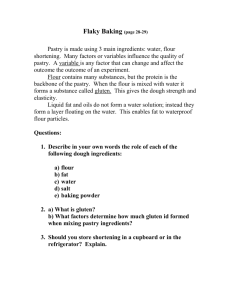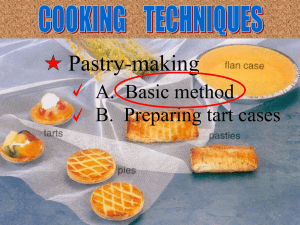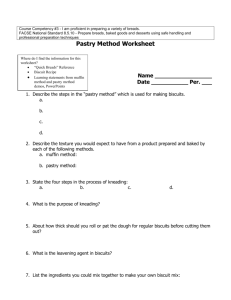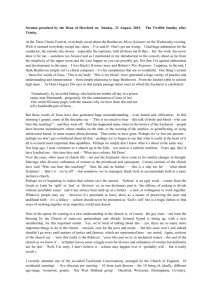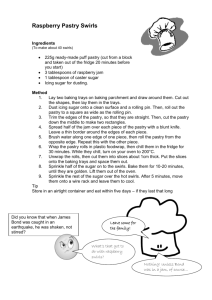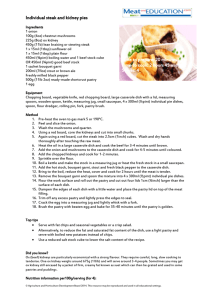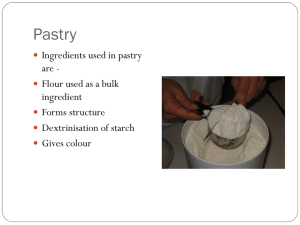pastry
advertisement
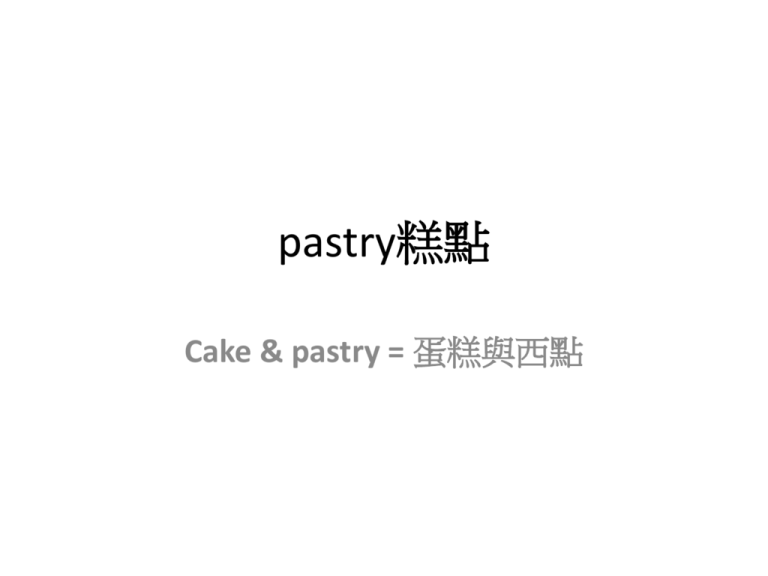
pastry糕點 Cake & pastry = 蛋糕與西點 糕點pastries • 糕點是糖果糕點的一種,Pastry is the name given to various kinds of baked products • 指以麵粉或米粉、糖、油脂、蛋、乳品等為主 要原料,配以各種輔料、餡料和調味料,made from ingredients such as flour, sugar, milk, butter, shortening, baking powder, and eggs. • 初製成型,再經蒸、烤、炸、炒等方式加工製 成。 • 糕點品種多樣,月餅、蛋糕、酥餅等均屬糕點。 Small tarts and other sweet baked products are called "pastries." 西點 • 西點一詞譯自英文「pastry」一字,而此字 衍生自「paste」。 • paste是指由粉類、液體及油脂等材料混合 而成的製品。廣泛地說,在西方國家幾乎 將所有以麵糰或麵糊製成的點心都稱為西 點。 西式點心品項 • 派(pie)類及塔(tart)類是歐美最普及的點心,派類通常 較為豪邁大器,不走精緻路線,符合美國人大口吃肉 的形象;塔類源於歐洲的血統,使其偏向小巧精緻、 色彩豐富且口味多變,兩者皆充分反應其發源地的民 族性。 • 鬆餅類puff pastry • 慕斯類(mousse)產品。通常,慕斯產品因顏色鮮豔, 造型多變,口感冰涼柔滑, • 道納司(doughnuts) • 奶油空心餅(cream puff) • 披薩(pizza) • Pastry may also refer to the dough from which such baked products are made. Pastry dough is rolled out thin and used as a base for baked products. • Common pastry dishes include pies, tarts, quiches and pasties. • Pastry is differentiated from bread by having a higher fat content, which contributes to a flaky or crumbly texture. • A good pastry is light and airy and fatty, but firm enough to support the weight of the filling. When making a shortcrust pastry, care must be taken to blend the fat and flour thoroughly before adding any liquid. This ensures that the flour granules are adequately coated with fat and less likely to develop gluten. • On the other hand, overmixing results in long gluten strands that toughen the pastry. • In other types of pastry such as Danish pastry and croissants, the characteristic flaky texture is achieved by repeatedly rolling out a dough similar to that for yeast bread, spreading it with butter, and folding it to produce many thin layers. pasties • adj. (臉色)蒼白的;麵糊[麵團]似的;(肌肉) 鬆軟的; • n. 餡餅;麵糊似的;葡式蛋塔; 中國的糕點 • 唐以前無「糕」之說,但稱米臭、糍、餌食追。《周禮·天官》記 載「籩人羞籩實,糗餌粉粢」。《玉篇》:「餈,糕也。」餈與餌 都是古代糕點。《楚辭》中《招魂》中也有「食巨敉蜜餌」,「食 巨敉」。漢代《西京雜記》記載:「九月九日,佩茱萸、食蓬餌、 飲菊花酒、食人長壽。」西漢史游《急就篇》中有「餅餌麥飯甘豆 羹」的記載。南北朝的食譜《食次》上記載了年糕「白繭糖」的做 法:「熟炊秫稻米飯,及熱於杵臼淨者,舂之為米咨糍,須令極熟, 勿令有米粒」。彭大翼在《山堂肆考·飲食·卷二》中提到了唐代武 則天常令宮女採收花粉製作「花精糕」,分賜群臣。 • 糕點真正受到重視,還是唐代飲茶之風盛行的事,最初佐茶的糕 點餅餌被稱為「茶食」。至李時珍時,有「糕以黍、糯和粳米粉合 蒸成,狀如凝膏也」之說。《帝京景物略》記載,崇禎時,北京 「正月元旦,啖黍糕,曰年年糕」。 List of pastries • This is a list of pastries, which are small cakes or confections made using pastry — a stiff dough enriched with fat. • Some dishes, such as pies, are made of a pastry casing that covers or completely contains a filling of various sweet or savory ingredients. • There are six basic types of pastry (a food that combines flour and fat) - these are shortcrust pastry, filo pastry, choux pastry, crumble pastry, flaky pastry and puff pastry. • Many pastries are prepared using shortening, a fat food product that is solid at room temperature, the composition of which lends to creating crumbly, shortcrust-style pastries and pastry crusts. • Pastries were first created by the ancient Egyptians. The classical period of ancient Greece and Rome had pastries made with almonds, flour, honey and seeds. The introduction of sugar into European cookery resulted in a large variety of new pastry recipes in France, Italy, Spain and Switzerland. The greatest innovator was Marie-Antoine Carême who perfected puff pastry and developed elaborate designs of pâtisserie 法式糕點店; 法式糕點. Types (6 種種類) • Shortcrust pastry – Shortcrust pastry is the simplest and most common pastry. It is made with flour, fat, butter, salt, and water to bind the dough. This is used mainly in tarts. It is also the pastry that is used most often in making a quiche. The process of making pastry includes mixing of the fat and flour, adding water, and rolling out the paste. The fat is mixed with the flour first, generally by rubbing with fingers or a pastry blender, which inhibits gluten formation by coating the gluten strands in fat and results in a short (as in crumbly; hence the term shortcrust), tender pastry. A related type is the sweetened sweetcrust pastry, also known as paté sucrée, in which sugar and egg yolks have been added (rather than water) to bind the pastry. – a kind of PASTRY . made with half as much fat as flour 起酥餅﹐酥(皮)點心 • Flaky pastry – Flaky pastry is a simple pastry that expands when cooked due to the number of layers. It bakes into a crisp, buttery pastry. The "puff" is obtained by the shard-like layers of fat, most often butter or shortening, creating layers which expand in the heat of the oven when baked. • Puff pastry – Puff pastry has many layers that cause it to expand or “puff” when baked. Puff pastry is made using flour, butter, salt, and water. The pastry rises up due to the water and fats expanding as they turn into steam upon heating. Puff pastries come out of the oven light, flaky, and tender. • Choux pastry – Choux pastry is a very light pastry that is often filled with cream. Unlike other types of pastry, choux is in fact closer to a dough before being cooked which gives it the ability to be piped into various shapes such as the éclair and profiterole. Its name originates from the French choux, meaning cabbage, owing to its rough cabbage-like shape after cooking. Choux begins as a mixture of milk or water and butter which are heated together until the butter melts, to which flour is added to form a dough. Eggs are then beaten into the dough to further enrich it. This high percentage of water causes the pastry to expand into a light, hollow pastry. Initially, the water in the dough turns to steam in the oven and causes the pastry to rise; then the starch in the flour gelatinizes, thereby solidifying the pastry. Once the choux dough has expanded, it is taken out of the oven; a hole is made in it to let the steam out. The pastry is then placed back in the oven to dry out and become crisp. The pastry is filled with various flavors of cream and is often topped with chocolate. Choux pastries can also be filled with ingredients such as cheese, tuna, or chicken to be used as appetizers. profiterole éclair • crumble pastry – A crumble, also known as a brown betty, is a dish of British origin that can be made in a sweet or savoury version, depending on ingredients used, although the sweet version is much more common. It also can be traced to American cuisine during the European colonization of the Americas. A sweet variety usually contains stewed fruit topped with a crumbly mixture of fat (usually butter), flour, and sugar. A savoury version uses meat, vegetables and a sauce for the filling, with cheese replacing sugar in the crumble mix. The crumble is baked in an oven until the topping is crisp. The dessert variety is often served with custard, cream or ice cream as a hearty, warm dessert after a meal. The savory variety can be served along with accompanying vegetables. • Phyllo (Filo) – Phyllo is a paper-thin pastry dough that is used in many layers. The phyllo is generally wrapped around a filling and brushed with butter before baking. These pastries are very delicate and flaky. Baklawa 中國糕點 分類 從工藝上分有8個大類: • 油酥類 • 混糖類 • 漿皮類 • 爐糕類 • 蒸糕類 • 酥皮類 • 油炸類 • 其它 在中國按地區分類有12個流派: • 京派 • 津派 • 蘇派 • 廣派 • 潮派 • 寧派 • 滬派 • 川派 • 揚派 • 滇派 • 閩派 • 西點 Background • Pastries go back to the ancient Mediterranean with almost paper-thin, multi-layered baklava and filo. • Northern Europe took on pastry-making after the Crusaders brought it back from the Mediterranean. French and Italian Renaissance chefs eventually perfected the puff and choux pastries, while 17th and 18th century chefs brought new recipes to the table. • These new pastries included brioche圓甜麵包, Napoleons, cream puffs, and éclairs. French chef Antonin Carême reportedly was the first to incorporate art in pastry making. brioche, Napoleons, cream puffs Definitions定義 • Pastry糕點: A type of food in famous dishes like pie and strudel果餡餅 • Pastry bag or Piping bag擠花袋: An often cone-shaped bag that is used to make an even stream of dough, frosting, or flavored substance to form a structure, decorate a baked good, or fill a pastry with a custard, cream, jelly, or other filling. • Pastry board板: A square or oblong board, preferably marble but usually wood, on which pastry is rolled out. • Pastry brake: Opposed and counter-rotating rollers with a variable gap through which pastry can be worked and reduced in thickness for commercial production. A small version is used domestically for pasta production. • Pastry case: An uncooked or blind baked pastry container used to hold savory or sweet mixtures. • Pastry cream: Confectioner's custard. An egg- and flourthickened custard made with sweetened milk flavored with vanilla. Used as a filling for flans, cakes, pastries, tarts, etc. The flour prevents the egg from curdling. • Pastry cutters: Various metal or plastic outlines of shapes, e.g. circles, fluted circles, diamonds, gingerbread men, etc., sharpened on one edge and used to cut out corresponding shapes from biscuit, scone, pastry, or cake mixtures. • Pastry blender: A kitchen implement used to properly combine the fat and flour. Usually constructed of wire or plastic, with multiple wires or small blades connected to a handle. • Viennoiserie可頌酥皮類: French term for "Viennese pastry," which, although it technically must be yeast raised, has now become used as a common term for many laminated and puff- and choux-based pastries, including croissants, brioche, and pain au chocolat. Chemistry • Different kinds of pastries are made by utilizing the natural characteristics of wheat flour and certain fats. • When wheat flour is mixed with water and kneaded into plain dough, it develops strands of gluten, which are what make bread tough and elastic. • In a typical pastry, however, this toughness is unwanted, so fat or oil is added to slow down the development of gluten.加油防麵筋產生 • Lard豬油 or suet牛羊板油work well because they have a coarse, crystalline structure that is very effective. • Using unclarified butter非澄清奶油 does not work well because of its water content; clarified butte澄清奶油r, which is virtually water-free, is better, but shortcrust pastry using only butter may develop an inferior texture. • If the fat is melted with hot water or if liquid oil is used, the thin oily layer between the grains offers less of an obstacle to gluten formation and the resulting pastry is tougher.所以要用冰奶油 History • The European tradition of pastry-making is often traced back to the shortcrust era of flaky doughs that were in use throughout the Mediterranean in ancient times. • In the ancient Mediterranean, the Romans, Greeks and Phoenicians all had filo-style pastries in their culinary traditions. There is also strong evidence that Egyptians produced pastry-like confections. They had professional bakers that surely had the skills to do so, and they also had needed materials like flour, oil, and honey. • In the plays of Aristophanes, written in the 5th century BC, there is mention of sweetmeats, including small pastries filled with fruit. The Roman cuisine used flour, oil and water to make pastries that were used to cover meats and fowls during baking in order to keep in the juices, but the pastry was not meant to be eaten. • A pastry that was meant to be eaten was a richer pastry that was made into small pastries containing eggs or little birds and that were often served at banquets. Greeks and Roman both struggled in making a good pastry because they used oil in the cooking process, and oil causes the pastry to lose its stiffness. • In the medieval cuisine of Northern Europe, pastry chefs were able to produce nice, stiff pastries because they cooked with shortening and butter. Some incomplete lists of ingredients have been found in medieval cookbooks, but no full, detailed versions. There were stiff, empty pastries called coffins or 'huff paste', that were eaten by servants only and included an egg yolk glaze to help make them more enjoyable to consume. Medieval pastries also included small tarts to add richness. • It was not until about the mid-16th century that actual pastry recipes began appearing. These recipes were adopted and adapted over time in various European countries, resulting in the myriad pastry traditions known to the region, from Portuguese "pastéis de nata" in the west to Russian "pirozhky" in the east. • The use of chocolate in pastry-making in the west, so commonplace today, arose only after Spanish and Portuguese traders brought chocolate to Europe from the New World starting in the 16th century. • Many culinary historians consider French pastry chef Antonin Carême (1784–1833) to have been the first great master of pastry making in modern times. • Pastry-making also has a strong tradition in many parts of Asia. Chinese pastry is made from rice, or different types of flour, with fruit, sweet bean paste or sesame-based fillings. • Beginning in the 19th century, the British brought western-style pastry to the far east, though it would be the French-influenced Maxim in the 1950s that made western pastry popular in Chinese-speaking regions starting with Hong Kong. Still, the term "western cake" (西餅) is used to differentiate between the automatically assumed Chinese pastry • Other Asian countries such as Korea prepare traditional pastryconfections such as tteok, hangwa, and yaksik with flour, rice, fruits, and regional specific ingredients to make unique desserts. Japan also has specialized pastry-confections better known as mochi and manjū. • Pastry-confections that originate in Asia are clearly distinct from those that originate in the west, which are generally much sweeter. Pastry chefs • Pastry chefs use a combination of culinary ability and creativity in baking, decoration, and flavoring with ingredients. • Many baked goods require a lot of time and focus. Presentation is an important aspect of pastry and dessert preparation. The job is often physically demanding, requiring attention to detail and long hours. • Pastry chefs are also responsible for creating new recipes to put on the menu, and they work in restaurants, bistros, large hotels, casinos and bakeries. • Pastry baking is usually done in an area slightly separate from the main kitchen. This section of the kitchen is in charge of making pastries, desserts, and other baked goods. Bakery麵包糕餅店 • A bakery (or baker's shop) is an establishment that produces and sells flour-based food baked in an oven such as bread, cakes, pastries, and pies. Some retail bakeries are also cafés, serving coffee and tea to customers who wish to consume the baked goods on the premises. • 麵包糕餅店,零售糕餅、麵包的專門店,專門售賣麵包 或以售賣麵包為主的稱為麵包店,專門售賣糕餅或以售 賣糕餅為主的的稱為餅店。 • 有些麵包糕餅店會於店裡生產所售賣之貨品,亦有些會 提供飲料及少量座位供客人於店內進食所售賣的食品。 • 在租金昂貴的商業市中心,連鎖店內的糕餅生產,多數 是後期生產,即是烘焙這一個工序,而前期生產如搓麵 粉、待發酵等多以店外中央工場進行生產。 英文大惡補 • • • • • • • • Bread Cake Pastry Pasty Pie Tart Cookie Dessert • • • • • • • • Flour 【flaʊr】 Sugar & Salt Yeast Egg (white, yolk) Milk & milk products Spice Flavoring Coloring • • • • Measure Formula Mix Knead [nid]揉(麵糰、黏 土等),捏 • Leaven[ˋlɛvən] – n.名詞 • 酵母,酵素[U] – vt.及物動詞 • (加酵母)使發酵;使發鬆 • Bake • Assemble • Decorate • • • • • Dough Batter Filling, stuffing Cream Frosting, icing
